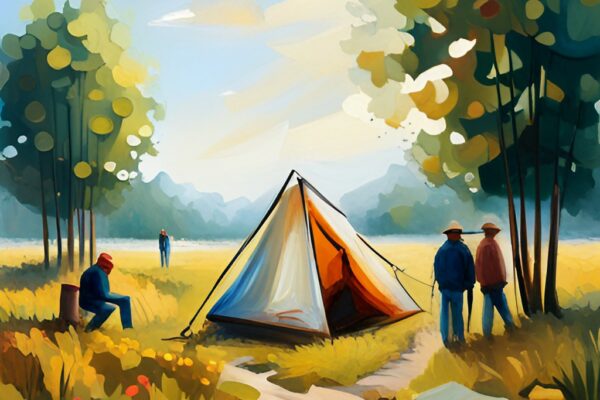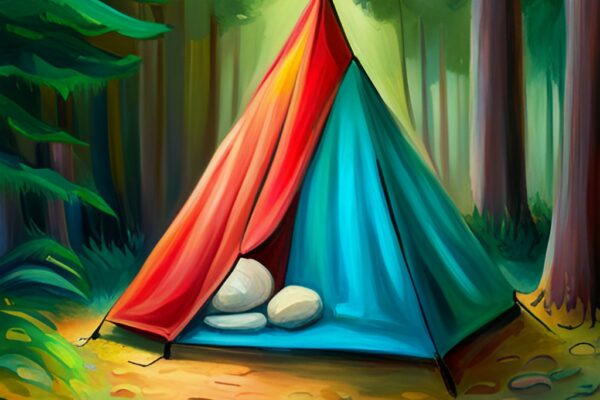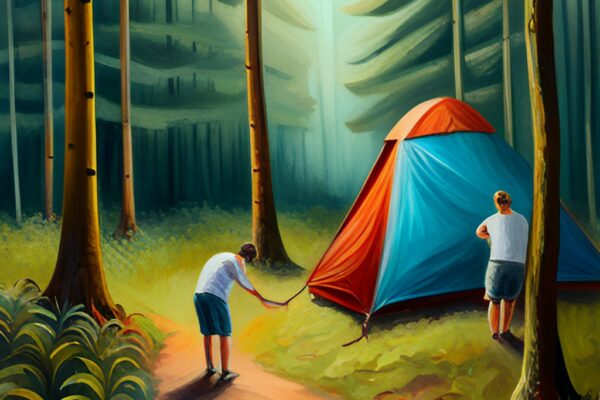
Nothing beats the feeling of camping out in the great outdoors, but sometimes even the most well-planned camping trips can go awry. When things start to go wrong, it can be hard to determine whether your camping experience is simply hitting a few bumps in the road or if it’s actually turning into a disaster.
If you find yourself questioning your choice to go tent camping, keep your eyes peeled for a few telltale signs. From relentless rain to misbehaving gear, we’ve compiled a list of the most common indicators that your tent camping trip might just be headed for disaster.
Even better, we identify what you can do to react and hopefully turn the trip around.
10 signs your tent camping trip is a disaster
- You arrive at the campsite to find that it’s closed or full, leaving you without a place to pitch your tent.
- You forgot essential gear such as your tent, sleeping bags, or camp stove, leaving you without basic necessities.
- The weather takes a turn for the worse, and you’re caught in a severe thunderstorm or other extreme weather conditions.
- You encounter a pest infestation in your campsite, such as ants, mosquitoes, or even bears, making it impossible to relax.
- You or one of your camping companions becomes ill or injured, requiring medical attention or even an emergency evacuation.
- You encounter equipment failure, such as a broken tent pole, ripped tent fabric, or a leaky air mattress, leaving you without essential gear.
- You run out of food or water, leaving you hungry, thirsty, and unable to enjoy your camping experience.
- You encounter unfriendly or disruptive neighbors at the campsite, making relaxing and enjoying your time difficult.
- You become lost or disoriented while hiking or exploring, leaving you without a clear path to safety.
- You experience a vehicle breakdown or other transportation-related issues, making it difficult to get to the campsite or leave the campsite at the end of your trip.
In conclusion, these are ten signs that your tent camping trip may be a disaster. While some of these issues are beyond your control, many can be prevented with proper planning, preparation, and attention to detail. You’ll learn that researching your campsite, packing all necessary gear, checking the weather forecast, and taking safety precautions to ensure that your camping trip is a success.
- 1. You arrive at the campsite to find that it’s closed or full, leaving you without a place to pitch your tent
- 2. You forgot essential gear such as your tent, sleeping bags, or camp stove, leaving you without basic necessities
- 3. The Weather Takes A Turn For The Worse, And You’re Caught In A Severe Thunderstorm Or Other Extreme Weather Conditions.
- 4. You encounter a pest infestation in your campsite, such as ants, mosquitoes, or even bears, making it impossible to relax
- 5. You or one of your camping companions becomes ill or injured, requiring medical attention or even an emergency evacuation
- 6. You encounter equipment failure, such as a broken tent pole, ripped tent fabric, or a leaky air mattress, leaving you without essential gear
- 7. You run out of food or water, leaving you hungry, thirsty, and unable to enjoy your camping experience
- 8. You encounter unfriendly or disruptive neighbors at the campsite, making relaxing and enjoying your time difficult
- 9. You become lost or disoriented while hiking or exploring, leaving you without a clear path to safety
- 10. You experience a vehicle breakdown or other transportation-related issues, making it difficult to get to the campsite or leave the campsite at the end of your trip
- 10 signs your tent camping trip is a disaster- Conclusion
1. You arrive at the campsite to find that it’s closed or full, leaving you without a place to pitch your tent
Arriving at a closed or full campsite can be a frustrating and disappointing experience, but there are several things you can do to salvage your tent camping trip and find a place to stay:
- Research Nearby Campsites: Check your map or GPS for other campsites in the area. Look for public lands, state parks, or private campgrounds that may have availability. You can also check online camping resources for nearby campsites and their availability.
- Look for Alternative Accommodations: If you’re unable to find a nearby campsite, consider other accommodation options such as hotels, cabins, or RV parks. While it may not be the camping experience you had planned, it can still be a fun and memorable trip.
- Camp in a Different Location: If you’re unable to find a designated campsite, consider finding a suitable location to pitch your tent, such as a national forest or other public land. Be sure to follow Leave No Trace principles and obtain any necessary permits or permissions before setting up camp.
- Plan Ahead: To prevent this situation from happening in the future, plan ahead and make reservations for campsites or alternative accommodations ahead of time. Research the availability of campsites and book early to ensure that you have a place to stay.
Arriving at a closed or full campsite can be frustrating, but several options are available to salvage your tent camping trip. By researching nearby campsites, looking for alternative accommodations, camping in a different location, or planning ahead, you can improve your chances of finding a place to stay and enjoying a successful camping trip.
2. You forgot essential gear such as your tent, sleeping bags, or camp stove, leaving you without basic necessities
Forgetting essential gear for your camping trip can be a stressful situation, but there are several things you can do to improve your tent camping trip and still enjoy your time outdoors:
- Check Local Stores: If you’re in a populated area, check local stores for outdoor gear such as tents, sleeping bags, or camp stoves. Many stores offer rental gear, or you may be able to purchase the necessary equipment.
- Borrow Gear: Reach out to friends or family members who may have the necessary equipment and are willing to lend it to you for your trip.
- Make Do with What You Have: If you can’t borrow or buy gear, try to make do with what you have. For example, you can use a tarp or a plastic sheet to create a makeshift shelter instead of a tent. You can also use layers of clothing or blankets to stay warm instead of a sleeping bag.
- Adjust Your Plans: If you cannot acquire the necessary equipment, consider adjusting your plans. For example, you may need to camp in a different location providing shelter or food access.
- Plan Ahead: To prevent this situation from happening in the future, create a camping checklist and double-check your gear before leaving for your trip. Make sure you have all the necessary equipment, and consider packing backups for essential items.
Forgetting essential gear for your camping trip can be stressful, but several options are available to improve your tent camping trip. By checking local stores, borrowing gear, making do with what you have, adjusting your plans, or planning ahead, you can enjoy a successful camping trip even if you forget essential gear.
3. The Weather Takes A Turn For The Worse, And You’re Caught In A Severe Thunderstorm Or Other Extreme Weather Conditions.
Being caught in severe weather conditions during a tent camping trip can be a scary and dangerous situation. It’s important to take steps to protect yourself and your camping gear. Here are some tips on what to do if this happens and how you can improve your tent camping trip:
- Seek Shelter: The first priority in severe weather conditions is to seek shelter. Look for a sturdy building, such as a restroom or ranger station, or if no such building is available, seek shelter in your tent. Make sure that your tent is properly set up and that it can withstand the strong winds and rain. Avoid setting up your tent in low-lying areas where water can accumulate.
- Stay Dry: Wet clothing and gear can lead to hypothermia, which can be dangerous in severe weather conditions. Make sure to wear appropriate clothing that is waterproof and breathable. If your clothing or gear gets wet, change into dry clothes as soon as possible.
- Stay Informed: Monitor weather conditions through local news or weather apps on your phone. Be aware of any warnings or advisories and take appropriate action. Consider investing in a weather radio or satellite phone for communication in remote areas.
- Wait it Out: In severe weather conditions, waiting out the storm is often best. Stay put in your shelter until the storm passes, and don’t venture out until it’s safe to do so.
- Improve Your Gear: To improve your tent camping trip in severe weather conditions, invest in high-quality camping gear that is designed to withstand extreme weather. This includes a sturdy tent, waterproof and breathable clothing, and appropriate footwear.
Being caught in severe weather conditions during a tent camping trip can be dangerous, but there are steps you can take to protect yourself and your camping gear. Seek shelter, stay dry, stay informed, wait out the storm, and invest in high-quality camping gear to improve your tent camping trip in severe weather conditions.
4. You encounter a pest infestation in your campsite, such as ants, mosquitoes, or even bears, making it impossible to relax
Encountering a pest infestation during a tent camping trip can be a frustrating and uncomfortable experience, but there are several things you can do to improve your situation and continue enjoying your trip:
- Identify the Pests: The first step in dealing with a pest infestation is identifying the type of pest. This will help you determine the best course of action. For example, different types of insects require different methods of control, and encountering a bear requires different actions than dealing with mosquitoes.
- Take Preventative Measures: To prevent a pest infestation, make sure to properly store food and garbage. This can help prevent attracting insects and other animals to your campsite. Make sure also to use bug spray or mosquito netting to prevent bites.
- Control the Pests: If you’re already dealing with a pest infestation, there are several methods you can use to control the pests. For example, insect repellent or citronella candles can help keep mosquitoes and insects away. You can also use insecticides or traps to control ants or other insects.
- Contact Park Rangers: If you encounter a bear or other dangerous animal, contact the park rangers immediately. They can provide advice and assistance in dealing with the situation.
- Improve Your Gear: To prevent future pest infestations, invest in camping gear designed to prevent pests from entering your tent or campsite. For example, you can use bug-proof tents or mosquito netting to prevent insects from entering your sleeping area.
Encountering a pest infestation during a tent camping trip can be frustrating, but there are several things you can do to improve your situation and continue enjoying your trip. Identify the pests, take preventative measures, control the pests, contact park rangers if necessary, and invest in camping gear designed to prevent future pest infestations.
5. You or one of your camping companions becomes ill or injured, requiring medical attention or even an emergency evacuation
Experiencing an illness or injury during a tent camping trip can be a serious and potentially life-threatening situation. It’s important to take quick and appropriate action to ensure the health and safety of everyone involved. Here are some tips on what to do if this happens and how you can improve your tent camping trip:
- Evaluate the Situation: Assess the severity of the illness or injury and determine if medical attention is necessary. If it’s a minor injury or illness, you may be able to provide first aid on your own. However, if the condition is severe, seek medical attention immediately.
- Contact Emergency Services: If the situation is serious, contact emergency services for medical assistance or evacuation. Call 911 or the emergency services number for the area you’re in. Provide clear and accurate information about the location and nature of the emergency.
- Stay Calm and Comfortable: If medical attention or evacuation is required, stay calm and comfortable. Provide first aid if necessary, and keep the person warm and hydrated.
- Plan Ahead: To prevent this situation from happening in the future, plan ahead and prepare for emergencies. Carry a first-aid kit and other necessary medical supplies, and ensure you have a plan in an emergency.
- Improve Your Gear: To improve your tent camping trip in case of an emergency, invest in camping gear designed to help with medical emergencies. This includes a first-aid kit, emergency blankets, and other necessary medical supplies.
Experiencing an illness or injury during a tent camping trip can be a serious situation, but there are steps you can take to improve the situation and ensure the health and safety of everyone involved. Evaluate the situation, contact emergency services if necessary, stay calm and comfortable, plan ahead, and invest in camping gear designed to help with medical emergencies.
6. You encounter equipment failure, such as a broken tent pole, ripped tent fabric, or a leaky air mattress, leaving you without essential gear
Encountering equipment failure during a tent camping trip can be frustrating and make the trip less enjoyable. However, there are several things you can do to improve your situation and continue enjoying your trip:
- Assess the Damage: The first step in dealing with equipment failure is to assess the damage. Determine the severity of the damage and whether it can be repaired or needs to be replaced.
- Make Temporary Repairs: If the equipment can be temporarily repaired, do so immediately. For example, you can use duct tape to fix a tear in your tent or sleeping bag or use a patch kit to repair an air mattress. These temporary repairs can help you continue using the equipment until a permanent repair can be made.
- Contact the Manufacturer: If the equipment is under warranty or still under the manufacturer’s guarantee, contact the manufacturer for repairs or replacement. This can be a more cost-effective solution than purchasing new equipment.
- Rent or Borrow Equipment: If you’re unable to repair or replace the equipment, consider renting or borrowing the necessary gear from a local outdoor store or other campers. This can help you continue enjoying your trip without purchasing new equipment.
- Improve Your Gear: To prevent future equipment failure, invest in high-quality camping gear designed to withstand the wear and tear of camping. This includes a sturdy tent, high-quality sleeping bags, and reliable air mattresses.
Encountering equipment failure during a tent camping trip can be frustrating, but there are several things you can do to improve your situation and continue enjoying your trip. Assess the damage, make temporary repairs, contact the manufacturer, rent or borrow equipment, and invest in high-quality camping gear to prevent future equipment failure.
7. You run out of food or water, leaving you hungry, thirsty, and unable to enjoy your camping experience
Running out of food or water during a tent camping trip can be a frustrating experience, especially when you’re far away from any nearby stores or facilities. However, there are several things you can do to improve your situation and continue enjoying your trip:
- Prioritize: Prioritize what’s most important – water is essential for survival, so if you’re running low on food and water, prioritize drinking water.
- Find Nearby Facilities: Check your surroundings for nearby stores or facilities offering food or water. This can be a local camp store, a nearby gas station, or even a convenience store.
- Plan Ahead: To prevent running out of food or water in the future, plan ahead and bring enough food and water for the duration of your camping trip. This includes bringing extra food and water in case of emergency situations.
- Utilize Natural Resources: If you’re camping in a location with natural water sources such as streams or lakes, you can filter and purify the water to make it safe for drinking. You can also fish or forage for food if you’re skilled in these areas.
- Improve Your Gear: To prevent future situations where you run out of food or water, invest in camping gear to help you better manage your supplies. This includes water filtration systems, food storage containers, and camp stoves for cooking.
Running out of food or water during a tent camping trip can be frustrating, but there are several things you can do to improve your situation and continue enjoying your trip. Prioritize, find nearby facilities, plan, utilize natural resources, and invest in camping gear to help you manage your supplies better.
8. You encounter unfriendly or disruptive neighbors at the campsite, making relaxing and enjoying your time difficult
Encountering unfriendly or disruptive neighbors at the campsite can be a frustrating and uncomfortable situation. However, there are several things you can do to improve your situation and continue enjoying your trip:
- Try to Resolve the Issue: If the neighbors are being disruptive or unfriendly, try to resolve the issue by talking to them. Politely explain how their behavior is affecting your camping experience and try to find a solution together.
- Contact Campsite Management: If the neighbors are unwilling to cooperate or the issue persists, contact the campsite management. They can help mediate the situation and ensure everyone is following the campsite rules and regulations.
- Move Campsites: If the situation cannot be resolved and is affecting your camping experience, consider moving to a different campsite. Most campsites have multiple campsites available, so talk to the campsite management about switching to a different site.
- Plan Ahead: To prevent this situation from happening in the future, plan ahead and choose campsites that have a reputation for being family-friendly and peaceful. Research the campsite before booking to ensure it’s the right fit for you and your camping needs.
- Bring Earplugs and Noise-Canceling Headphones: If the neighbors are being disruptive with noise, bring earplugs or noise-canceling headphones to help block out the noise and make it easier to sleep and relax.
Encountering unfriendly or disruptive neighbors at the campsite can be an uncomfortable situation, but there are several things you can do to improve your situation and continue enjoying your trip. Try to resolve the issue, contact campsite management, move campsites, plan ahead, and bring earplugs or noise-canceling headphones to help block out noise.
9. You become lost or disoriented while hiking or exploring, leaving you without a clear path to safety
Becoming lost or disoriented while hiking or exploring can be a scary situation, but there are several things you can do to improve your situation and ensure your safety:
- Stay Calm: The first thing to do when you realize you’re lost or disoriented is to stay calm. Take a deep breath and try to remain level-headed. Panic can make it harder to think clearly and make good decisions.
- Stop and Assess Your Situation: Stop and take stock of your surroundings. Try to retrace your steps or use a map or GPS device to determine your location. If you’re unable to determine your location, stay put until help arrives.
- Signal for Help: If you have a whistle or other signaling device, use it to signal for help. Yell for help if you’re near other hikers or campers. You can also use brightly colored clothing or a mirror to attract attention.
- Follow Basic Survival Tips: If you’re unable to signal for help, follow basic survival tips. Find a place to shelter from the elements, start a fire to stay warm, and conserve your energy by staying hydrated and eating small amounts of food.
- Stay Put: If you’re lost or disoriented and unable to determine your location, stay put. Moving around can make it harder for rescuers to find you. Instead, make yourself visible and wait for rescue personnel to arrive.
Becoming lost or disoriented while hiking or exploring can be a scary situation. Still, there are several things you can do to improve your situation and ensure your safety. Stay calm, stop and assess your situation, signal for help, follow basic survival tips, and stay put if you cannot determine your location. Remember to always hike with a map, compass, and GPS device, and let someone know your planned route and expected return time.
10. You experience a vehicle breakdown or other transportation-related issues, making it difficult to get to the campsite or leave the campsite at the end of your trip
Experiencing a vehicle breakdown or other transportation-related issues can be a frustrating situation. However, there are several things you can do to improve your situation and ensure you can still enjoy your tent camping trip:
- Stay Calm: The first thing to do when you experience a vehicle breakdown or other transportation-related issues is to stay calm. Take a deep breath and try to remain level-headed. Panic can make it harder to think clearly and make good decisions.
- Evaluate the Situation: Evaluate your situation and determine if it’s safe to continue driving or if you need to pull over and wait for assistance. If it’s safe to continue driving, do so cautiously and keep an eye out for signs of further trouble.
- Call for Assistance: If you need assistance, call for help. Roadside assistance services can help with various issues, including flat tires, dead batteries, and other vehicle-related issues. If you’re at a campsite, talk to the campsite management to see if they can help.
- Make Alternative Plans: If your vehicle cannot be repaired or you can’t get to the campsite, make alternative plans. Consider renting a vehicle or using public transportation to get to the campsite. Alternatively, you could choose a closer campsite or delay your trip until transportation issues can be resolved.
- Stay Flexible: Transportation-related issues can be unpredictable, so it’s important to stay flexible and be willing to adjust your plans if necessary. Remember that the most important thing is to stay safe and enjoy your time in nature, regardless of any transportation challenges.
Experiencing a vehicle breakdown or other transportation-related issues can be a frustrating situation. However, there are several things you can do to improve your situation and ensure you can still enjoy your tent camping trip. Stay calm, evaluate the situation, call for necessary assistance, make alternative plans, and stay flexible. Remember that the most important thing is to stay safe and enjoy your time in nature, regardless of any transportation challenges.
10 signs your tent camping trip is a disaster- Conclusion
In conclusion, a disastrous tent camping trip can certainly put a damper on your outdoor adventure, but don’t let it ruin your experience entirely. Adaptation and improvisation may be the key to salvaging the situation. Instead of dwelling on the negative aspects of your trip, focus on the positive moments you did experience and try to appreciate them.
If possible, embrace the opportunity to explore nearby areas or engage in activities you may not have considered. Most importantly, take the experience as a learning opportunity and reflect on what you could do differently in the future to ensure a smoother and more enjoyable camping trip. Remember, sometimes life throws us a curveball, but it’s up to us to make the most of the situation.














